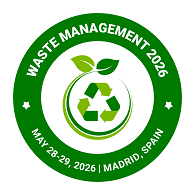Welcome Message
We are honored to welcome you to the 5th World Congress on Sustainable Waste Management, taking place May 28–29, 2026, in Madrid, Spain, under the theme “Innovations in Waste Management for a Greener Tomorrow”
This international forum will unite leading researchers, environmental scientists, policymakers, industry experts, and innovators to exchange knowledge, showcase sustainable technologies, and explore future directions in waste reduction, recycling, energy recovery, and circular economy solutions.
Set in the vibrant city of Madrid, the congress will feature keynote addresses, interactive sessions, hands-on workshops, and networking opportunities designed to inspire collaboration and drive sustainable action worldwide.
We warmly invite you to be part of this journey toward a cleaner, greener, and more sustainable future.
We look forward to welcoming you to Madrid in May 2026 for a transformative experience.
Warm regards,
Organizing Committee
5th World Congress on Sustainable Waste Management
About Conference
The 5th World Congress on Sustainable Waste Management is a premier global platform bringing together environmental scientists, engineers, policymakers, innovators, industry leaders, and sustainability advocates. The event focuses on cutting-edge research, emerging technologies, and global best practices in sustainable waste management, recycling, circular economy, and environmental protection.
Through keynote speeches, technical sessions, panel discussions, and exhibitions, the congress will explore innovative strategies to minimize waste, promote sustainable resource use, and accelerate the shift toward a zero-waste future.
Conference Objectives
-
Promote collaboration among researchers, industry leaders, and policymakers in waste management
-
Share innovative technologies, practices, and sustainable waste solutions
-
Foster circular economy and resource recovery models
-
Address challenges in e-waste, plastic waste, and hazardous waste management
-
Support global initiatives toward climate change mitigation and sustainable development
Who Should Attend?
-
Environmental Scientists & Researchers
-
Waste Management Professionals
-
Sustainability & Climate Experts
-
Recycling & Circular Economy Innovators
-
Government & Policy Representatives
-
Environmental Engineers
-
Green Technology Developers
-
Solid Waste & Hazardous Waste Experts
-
Urban Planners & Smart City Leaders
-
Energy-from-Waste Specialists
-
Plastic & E-Waste Recycling Experts
-
Water & Wastewater Treatment Specialists
-
NGOs & Sustainability Advocates
-
Industry Leaders & Entrepreneurs
-
Students & Academic Scholars in Environmental Sciences
Conference Highlights
-
Keynote sessions from globally recognized sustainability leaders
-
Interactive workshops & technical demonstrations
-
Scientific tracks & poster presentations
-
Networking opportunities with industry and academic experts
-
Exhibitor showcases on sustainable technologies & green solutions
-
Recognition awards & certification for speakers, delegates, and presenters
Benefits of Participation
Speaker Participation:
-
Present research to an international audience
-
Get published in conference proceedings
-
Enhance your professional and academic profile
-
Network with leading experts and peers
Delegate Participation:
-
Gain insights from top industry leaders
-
Receive a certificate of participation
-
Build valuable professional networks
-
Stay updated on new rehabilitation technologies and best practices
Poster Presenter:
-
Gain visibility and network with peers and experts
-
Receive constructive feedback to improve your research
-
Build recognition and credibility in your field
-
Explore new career opportunities and collaborations
Workshop Participants:
-
Acquire practical skills from experienced trainers
-
Receive a certified workshop completion certificate
-
Learn real-world tools and techniques
-
Engage in focused, small-group learning
Sponsors Participation:
-
Boost global brand visibility
-
Connect with targeted healthcare audiences
-
Showcase leadership in the rehabilitation sector
-
Benefit from marketing and promotional exposure
Exhibitor Participation:
-
Display products/services to a global audience
-
Interact directly with decision-makers
-
Generate qualified business leads
-
Establish strategic partnerships
Sessions & Tracks
Track 1: Advances in Sustainable Waste Management
This session explores the latest global trends and strategies for sustainable waste handling. Topics include innovative collection, segregation, and disposal systems. Experts will discuss smart city waste solutions and advanced monitoring techniques. The focus will be on reducing landfill dependency and promoting resource recovery. Case studies from different countries will highlight practical implementation.
Waste Management Conferences | Recycling & Sustainability Summits | Global Circular Economy Forum 2026 | Climate Change & Environment Conferences Europe | E-Waste & Plastic Waste Conferences 2026 | List of Environmental Science Conferences | Upcoming Sustainability & Green Technology Events
Related Societies and Associations
International Solid Waste Association (ISWA) | Waste Management Society (WMS) | European Federation of Waste Management and Environmental Services (FEAD) | Global Recycling Foundation | American Society of Civil Engineers – Environmental Division | Society for Environmental Toxicology and Chemistry (SETAC) | European Environmental Bureau (EEB)
Track 2: Recycling & Resource Recovery Technologies
Delegates will learn about advanced recycling systems for plastics, metals, paper, and composites. Presentations will highlight energy-efficient sorting technologies and material recovery facilities. Emphasis will be on closing the loop through industrial reuse. New innovations in recycling technologies will be showcased. Practical applications and pilot projects will be discussed.
Waste Management Conferences | Recycling & Sustainability Summits | Global Circular Economy Forum 2026 | Climate Change & Environment Conferences Europe | E-Waste & Plastic Waste Conferences 2026 | List of Environmental Science Conferences | Upcoming Sustainability & Green Technology Events
Related Societies and Associations
International Solid Waste Association (ISWA) | Waste Management Society (WMS) | European Federation of Waste Management and Environmental Services (FEAD) | Global Recycling Foundation | American Society of Civil Engineers – Environmental Division | Society for Environmental Toxicology and Chemistry (SETAC) | European Environmental Bureau (EEB)
Track 3: Plastic Waste Reduction & Alternatives
This track addresses global concerns over single-use plastics and microplastics. Experts will highlight biodegradable alternatives and sustainable packaging innovations. Strategies for reducing ocean and land pollution will be presented. Policy-driven bans and corporate responsibility programs will be discussed. Participants will explore opportunities for eco-friendly product development.
Waste Management Conferences | Recycling & Sustainability Summits | Global Circular Economy Forum 2026 | Climate Change & Environment Conferences Europe | E-Waste & Plastic Waste Conferences 2026 | List of Environmental Science Conferences | Upcoming Sustainability & Green Technology Events
Related Societies and Associations
International Solid Waste Association (ISWA) | Waste Management Society (WMS) | European Federation of Waste Management and Environmental Services (FEAD) | Global Recycling Foundation | American Society of Civil Engineers – Environmental Division | Society for Environmental Toxicology and Chemistry (SETAC) | European Environmental Bureau (EEB)
Track 4: E-Waste Management & Circular Electronics
With the growing volume of discarded electronics, this session focuses on recycling, refurbishment, and safe disposal. Speakers will address challenges in recovering precious metals and rare earths. Circular design principles for electronics manufacturing will be emphasized. Case studies on e-waste legislation and compliance will be featured. Innovative business models like buy-back and refurbishing programs will be explored.
Waste Management Conferences | Recycling & Sustainability Summits | Global Circular Economy Forum 2026 | Climate Change & Environment Conferences Europe | E-Waste & Plastic Waste Conferences 2026 | List of Environmental Science Conferences | Upcoming Sustainability & Green Technology Events
Related Societies and Associations
International Solid Waste Association (ISWA) | Waste Management Society (WMS) | European Federation of Waste Management and Environmental Services (FEAD) | Global Recycling Foundation | American Society of Civil Engineers – Environmental Division | Society for Environmental Toxicology and Chemistry (SETAC) | European Environmental Bureau (EEB)
Track 5: Waste-to-Energy & Bioenergy Solutions
This session explores converting waste into renewable energy resources. Technologies like incineration, gasification, and anaerobic digestion will be discussed. Emphasis will be placed on efficiency, emissions reduction, and energy recovery. Case studies will highlight successful large-scale projects worldwide. Opportunities for integrating WtE plants into city energy grids will also be presented.
Waste Management Conferences | Recycling & Sustainability Summits | Global Circular Economy Forum 2026 | Climate Change & Environment Conferences Europe | E-Waste & Plastic Waste Conferences 2026 | List of Environmental Science Conferences | Upcoming Sustainability & Green Technology Events
Related Societies and Associations
International Solid Waste Association (ISWA) | Waste Management Society (WMS) | European Federation of Waste Management and Environmental Services (FEAD) | Global Recycling Foundation | American Society of Civil Engineers – Environmental Division | Society for Environmental Toxicology and Chemistry (SETAC) | European Environmental Bureau (EEB)
Track 6: Industrial & Hazardous Waste Treatment
Delegates will examine methods for treating toxic and industrial by-products. Sessions will cover chemical, thermal, and biological treatment techniques. Case studies will highlight hazardous waste reduction strategies. Global safety regulations and compliance challenges will be addressed. Industry partnerships for waste minimization will also be emphasized.
Waste Management Conferences | Recycling & Sustainability Summits | Global Circular Economy Forum 2026 | Climate Change & Environment Conferences Europe | E-Waste & Plastic Waste Conferences 2026 | List of Environmental Science Conferences | Upcoming Sustainability & Green Technology Events
Related Societies and Associations
International Solid Waste Association (ISWA) | Waste Management Society (WMS) | European Federation of Waste Management and Environmental Services (FEAD) | Global Recycling Foundation | American Society of Civil Engineers – Environmental Division | Society for Environmental Toxicology and Chemistry (SETAC) | European Environmental Bureau (EEB)
Track 7: Urban Waste Management & Smart Cities
This track highlights the integration of smart technologies in waste collection and processing. IoT-enabled bins, AI-powered route planning, and real-time tracking will be showcased. Cities adopting zero-waste policies will present their success stories. Sessions will cover urban challenges like landfill overuse and population growth. Future visions of sustainable, waste-free cities will be explored.
Waste Management Conferences | Recycling & Sustainability Summits | Global Circular Economy Forum 2026 | Climate Change & Environment Conferences Europe | E-Waste & Plastic Waste Conferences 2026 | List of Environmental Science Conferences | Upcoming Sustainability & Green Technology Events
Related Societies and Associations
International Solid Waste Association (ISWA) | Waste Management Society (WMS) | European Federation of Waste Management and Environmental Services (FEAD) | Global Recycling Foundation | American Society of Civil Engineers – Environmental Division | Society for Environmental Toxicology and Chemistry (SETAC) | European Environmental Bureau (EEB)
Track 8: Water, Wastewater & Sludge Management
Experts will address innovative wastewater treatment systems and resource recovery from sludge. Topics include biogas generation, nutrient recovery, and water reuse. Technologies for managing urban and industrial effluents will be featured. Sustainable wastewater management policies will be reviewed. Attendees will learn about circular approaches to water management.
Waste Management Conferences | Recycling & Sustainability Summits | Global Circular Economy Forum 2026 | Climate Change & Environment Conferences Europe | E-Waste & Plastic Waste Conferences 2026 | List of Environmental Science Conferences | Upcoming Sustainability & Green Technology Events
Related Societies and Associations
International Solid Waste Association (ISWA) | Waste Management Society (WMS) | European Federation of Waste Management and Environmental Services (FEAD) | Global Recycling Foundation | American Society of Civil Engineers – Environmental Division | Society for Environmental Toxicology and Chemistry (SETAC) | European Environmental Bureau (EEB)
Track 9: Zero-Waste Cities & Circular Economy Models
This session focuses on strategies to design cities with minimal waste. Policy-driven zero-waste initiatives will be presented. Circular business models that reuse resources will be discussed. Speakers will highlight success stories from global cities implementing these models. Corporate and community-driven zero-waste programs will be emphasized.
Waste Management Conferences | Recycling & Sustainability Summits | Global Circular Economy Forum 2026 | Climate Change & Environment Conferences Europe | E-Waste & Plastic Waste Conferences 2026 | List of Environmental Science Conferences | Upcoming Sustainability & Green Technology Events
Related Societies and Associations
International Solid Waste Association (ISWA) | Waste Management Society (WMS) | European Federation of Waste Management and Environmental Services (FEAD) | Global Recycling Foundation | American Society of Civil Engineers – Environmental Division | Society for Environmental Toxicology and Chemistry (SETAC) | European Environmental Bureau (EEB)
Track 10: Policy, Regulation & Global Sustainability Standards
This track explores international laws, environmental agreements, and sustainability policies. Participants will learn how governments enforce waste regulations. Case studies on extended producer responsibility (EPR) will be presented. UN and EU waste management frameworks will be discussed. Experts will debate challenges in global waste governance.
Waste Management Conferences | Recycling & Sustainability Summits | Global Circular Economy Forum 2026 | Climate Change & Environment Conferences Europe | E-Waste & Plastic Waste Conferences 2026 | List of Environmental Science Conferences | Upcoming Sustainability & Green Technology Events
Related Societies and Associations
International Solid Waste Association (ISWA) | Waste Management Society (WMS) | European Federation of Waste Management and Environmental Services (FEAD) | Global Recycling Foundation | American Society of Civil Engineers – Environmental Division | Society for Environmental Toxicology and Chemistry (SETAC) | European Environmental Bureau (EEB)
Track 11: Green Innovations & Sustainable Materials
The session explores new eco-friendly products and packaging innovations. Research on biodegradable composites, plant-based plastics, and green construction materials will be presented. Companies developing alternatives to hazardous substances will showcase solutions. Topics include design for recyclability and low-carbon material production. Attendees will gain insights into the future of sustainable product design.
Waste Management Conferences | Recycling & Sustainability Summits | Global Circular Economy Forum 2026 | Climate Change & Environment Conferences Europe | E-Waste & Plastic Waste Conferences 2026 | List of Environmental Science Conferences | Upcoming Sustainability & Green Technology Events
Related Societies and Associations
International Solid Waste Association (ISWA) | Waste Management Society (WMS) | European Federation of Waste Management and Environmental Services (FEAD) | Global Recycling Foundation | American Society of Civil Engineers – Environmental Division | Society for Environmental Toxicology and Chemistry (SETAC) | European Environmental Bureau (EEB)
Track 12: Landfill Diversion & Waste Minimization Strategies
This session addresses methods to reduce landfill dependency. Presentations will focus on recycling, composting, and reuse. Waste segregation at the source and public awareness campaigns will be discussed. Experts will share practical landfill diversion programs from around the world. Strategies to optimize waste reduction in industries and municipalities will be covered.
Waste Management Conferences | Recycling & Sustainability Summits | Global Circular Economy Forum 2026 | Climate Change & Environment Conferences Europe | E-Waste & Plastic Waste Conferences 2026 | List of Environmental Science Conferences | Upcoming Sustainability & Green Technology Events
Related Societies and Associations
International Solid Waste Association (ISWA) | Waste Management Society (WMS) | European Federation of Waste Management and Environmental Services (FEAD) | Global Recycling Foundation | American Society of Civil Engineers – Environmental Division | Society for Environmental Toxicology and Chemistry (SETAC) | European Environmental Bureau (EEB)
Track 13: Climate Change, Carbon Reduction & Waste Sector
Delegates will learn how waste management contributes to climate action. Sessions will highlight methane reduction, carbon capture, and low-emission technologies. Life cycle assessment of waste practices will be presented. Speakers will discuss aligning waste strategies with UN climate goals. Global case studies on carbon-neutral waste systems will be shared.
Waste Management Conferences | Recycling & Sustainability Summits | Global Circular Economy Forum 2026 | Climate Change & Environment Conferences Europe | E-Waste & Plastic Waste Conferences 2026 | List of Environmental Science Conferences | Upcoming Sustainability & Green Technology Events
Related Societies and Associations
International Solid Waste Association (ISWA) | Waste Management Society (WMS) | European Federation of Waste Management and Environmental Services (FEAD) | Global Recycling Foundation | American Society of Civil Engineers – Environmental Division | Society for Environmental Toxicology and Chemistry (SETAC) | European Environmental Bureau (EEB)
Track 14: Food Waste Management & Composting Technologies
This session covers solutions for reducing food waste at retail, household, and industrial levels. Composting techniques and bio-digesters will be highlighted. Experts will discuss food donation networks and redistribution programs. Policies for reducing food loss in supply chains will be presented. Circular food systems and sustainable agriculture practices will be emphasized.
Waste Management Conferences | Recycling & Sustainability Summits | Global Circular Economy Forum 2026 | Climate Change & Environment Conferences Europe | E-Waste & Plastic Waste Conferences 2026 | List of Environmental Science Conferences | Upcoming Sustainability & Green Technology Events
Related Societies and Associations
International Solid Waste Association (ISWA) | Waste Management Society (WMS) | European Federation of Waste Management and Environmental Services (FEAD) | Global Recycling Foundation | American Society of Civil Engineers – Environmental Division | Society for Environmental Toxicology and Chemistry (SETAC) | European Environmental Bureau (EEB)
Track 15: Role of AI, IoT & Digital Tools in Waste Solutions
Sessions will demonstrate how AI, robotics, and data analytics enhance waste management. Topics include smart sorting robots and predictive analytics for recycling plants. IoT applications in waste collection and monitoring will be showcased. Digital platforms for citizen participation will be discussed. Attendees will see how digital transformation boosts efficiency.
Waste Management Conferences | Recycling & Sustainability Summits | Global Circular Economy Forum 2026 | Climate Change & Environment Conferences Europe | E-Waste & Plastic Waste Conferences 2026 | List of Environmental Science Conferences | Upcoming Sustainability & Green Technology Events
Related Societies and Associations
International Solid Waste Association (ISWA) | Waste Management Society (WMS) | European Federation of Waste Management and Environmental Services (FEAD) | Global Recycling Foundation | American Society of Civil Engineers – Environmental Division | Society for Environmental Toxicology and Chemistry (SETAC) | European Environmental Bureau (EEB)
Track 16: Sustainable Packaging & Green Supply Chains
This track emphasizes eco-friendly packaging design and supply chain responsibility. Companies will present sustainable logistics and recyclable materials. Life cycle thinking in packaging will be discussed. Topics include extended producer responsibility (EPR) in supply chains. Participants will learn how to balance sustainability with business growth.
Waste Management Conferences | Recycling & Sustainability Summits | Global Circular Economy Forum 2026 | Climate Change & Environment Conferences Europe | E-Waste & Plastic Waste Conferences 2026 | List of Environmental Science Conferences | Upcoming Sustainability & Green Technology Events
Related Societies and Associations
International Solid Waste Association (ISWA) | Waste Management Society (WMS) | European Federation of Waste Management and Environmental Services (FEAD) | Global Recycling Foundation | American Society of Civil Engineers – Environmental Division | Society for Environmental Toxicology and Chemistry (SETAC) | European Environmental Bureau (EEB)
Track 17: Environmental Education & Public Awareness
This session explores the role of education and campaigns in reducing waste. Speakers will present innovative community engagement models. Case studies will highlight successful awareness movements worldwide. Schools, NGOs, and governments will share experiences. The focus will be on building long-term behavioral change.
Waste Management Conferences | Recycling & Sustainability Summits | Global Circular Economy Forum 2026 | Climate Change & Environment Conferences Europe | E-Waste & Plastic Waste Conferences 2026 | List of Environmental Science Conferences | Upcoming Sustainability & Green Technology Events
Related Societies and Associations
International Solid Waste Association (ISWA) | Waste Management Society (WMS) | European Federation of Waste Management and Environmental Services (FEAD) | Global Recycling Foundation | American Society of Civil Engineers – Environmental Division | Society for Environmental Toxicology and Chemistry (SETAC) | European Environmental Bureau (EEB)
Track 18: Marine & Ocean Plastic Pollution Control
This session addresses the urgent problem of marine litter and microplastics. Solutions for plastic collection, cleanup, and recycling will be presented. Policies banning ocean dumping and international cooperation will be emphasized. Marine ecosystems restoration efforts will be showcased. NGOs and global agencies will share their initiatives.
Waste Management Conferences | Recycling & Sustainability Summits | Global Circular Economy Forum 2026 | Climate Change & Environment Conferences Europe | E-Waste & Plastic Waste Conferences 2026 | List of Environmental Science Conferences | Upcoming Sustainability & Green Technology Events
Related Societies and Associations
International Solid Waste Association (ISWA) | Waste Management Society (WMS) | European Federation of Waste Management and Environmental Services (FEAD) | Global Recycling Foundation | American Society of Civil Engineers – Environmental Division | Society for Environmental Toxicology and Chemistry (SETAC) | European Environmental Bureau (EEB)
Track 19: Financing & Investment in Waste Management Projects
Delegates will learn about financial models for large-scale sustainability projects. Public-private partnerships and green investment funds will be explored. Strategies for securing funding for waste-to-energy plants will be highlighted. Experts will present successful investment case studies. Opportunities for startups and entrepreneurs will be discussed.
Waste Management Conferences | Recycling & Sustainability Summits | Global Circular Economy Forum 2026 | Climate Change & Environment Conferences Europe | E-Waste & Plastic Waste Conferences 2026 | List of Environmental Science Conferences | Upcoming Sustainability & Green Technology Events
Related Societies and Associations
International Solid Waste Association (ISWA) | Waste Management Society (WMS) | European Federation of Waste Management and Environmental Services (FEAD) | Global Recycling Foundation | American Society of Civil Engineers – Environmental Division | Society for Environmental Toxicology and Chemistry (SETAC) | European Environmental Bureau (EEB)
Track 20: Global Collaboration for a Zero-Waste Future
The final track emphasizes international cooperation in tackling waste challenges. Global frameworks like SDGs and Paris Agreement links will be discussed. Cross-border waste trade issues will be addressed. Collaborative networks and partnerships will be highlighted. Attendees will explore pathways to achieving a waste-free planet.
Waste Management Conferences | Recycling & Sustainability Summits | Global Circular Economy Forum 2026 | Climate Change & Environment Conferences Europe | E-Waste & Plastic Waste Conferences 2026 | List of Environmental Science Conferences | Upcoming Sustainability & Green Technology Events
Related Societies and Associations
International Solid Waste Association (ISWA) | Waste Management Society (WMS) | European Federation of Waste Management and Environmental Services (FEAD) | Global Recycling Foundation | American Society of Civil Engineers – Environmental Division | Society for Environmental Toxicology and Chemistry (SETAC) | European Environmental Bureau (EEB)
Visa Assistance
The Waste Management 2026 Organizing Committee would like to clarify that we do not handle visa applications or processing directly. However, we can provide participants with supporting documents that may assist in their application, including:
-
Letter of Invitation
-
Letter of Abstract Acceptance
-
Registration Payment Receipt
Please note that embassies may request additional documents beyond those provided by the conference.
Letter of Invitation:
This official document serves as confirmation that your abstract and registration have been accepted by the conference committee. It is issued in English and may support your visa application process.
Only registered participants are eligible to receive an official Letter of Invitation.
To issue the letter, participants must complete their registration and provide authenticated details such as:
-
Passport scan
-
Date of Birth
-
Contact Number
-
Residential Address
-
Recent Photograph
For further assistance, please contact Program Manager Jessica Jones at: medicalevents@globalconferencemeet.com
Official Letters of Invitation are provided exclusively for participation in the conference.
Visa Covering Letter
-
A personalized covering letter can be provided upon request.
-
It outlines the purpose of your visit, conference details, and confirmation of your participation.
-
This letter, together with the invitation and registration documents, may strengthen your visa application.
Market Analysis
The global waste management market size was estimated at USD 1,424.35 billion in 2024 and is projected to reach USD 2,365.14 billion by 2033, growing at a CAGR of 5.9% from 2025 to 2033. The growth is driven by the rapid rise in urbanization and industrialization, leading to a significant increase in solid waste generation.
Key Market Trends & Insights
-
North America dominated the waste management market with the largest revenue share of 33.3% in 2024.
-
The waste management industry in India is expected to grow at a substantial CAGR of 7.1% from 2025 to 2033.
-
By service type, the disposal service segment is expected to grow at a considerable CAGR of 6.4% from 2025 to 2033.
-
By waste type, the E-waste segment is expected to grow at a considerable CAGR of 8.0% from 2025 to 2033.
Market Size & Forecast
-
2024 Market Size: USD 1,424.35 Billion
-
2033 Projected Market Size: USD 2,365.14 Billion
-
CAGR (2025-2033): 5.9%
-
North America: Largest market in 2024
-
Asia Pacific: Fastest growing region
Expanding populations, especially in emerging economies, are straining existing waste infrastructure. Another major growth driver is the growing emphasis on environmental sustainability and circular economy practices. Industries and municipalities are investing in waste-to-energy technologies, advanced recycling methods, and digital waste tracking systems. Rising consumer awareness and corporate ESG commitments are further encouraging responsible waste disposal. These trends are accelerating the adoption of smart and sustainable waste management solutions worldwide.











